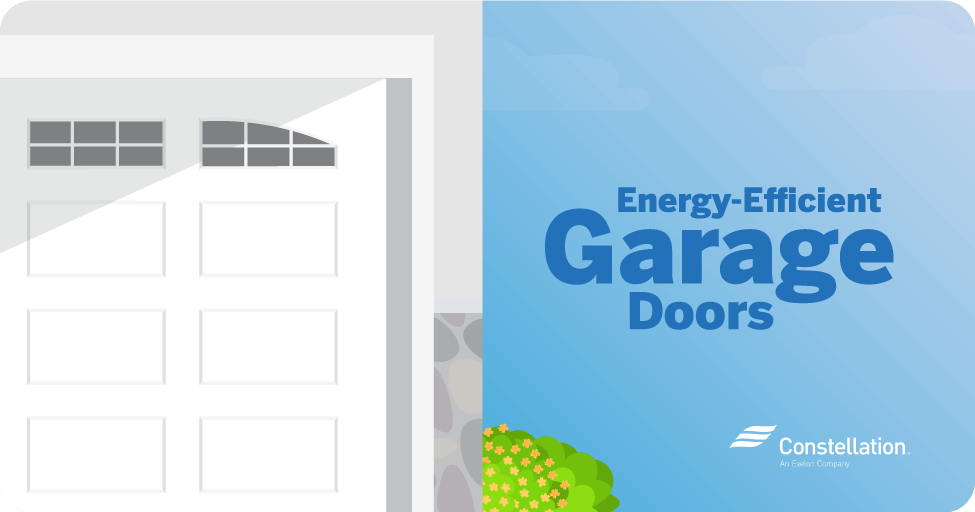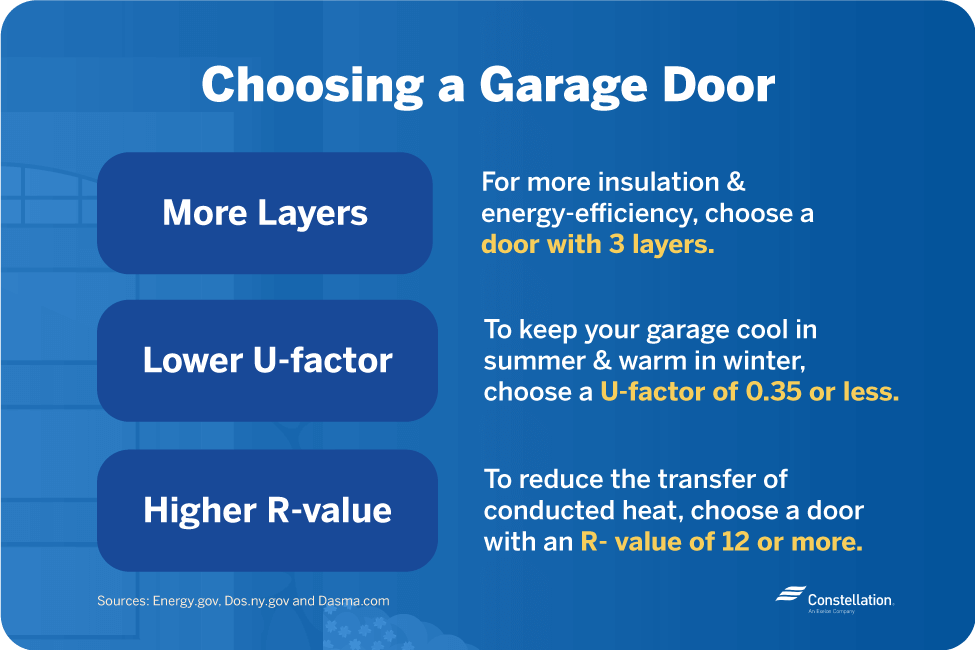
- Category:
Energy Efficiency -
Last updated:
July 28, 2022
Choosing Energy-Efficient Garage Doors
Garages are rarely connected to a home’s heating and cooling system, so why insulate a garage door? Energy-efficient smart garage doors offer a range of advantages, from cooling the garage during hot weather to offering better security. The right garage door can even increase the value of your home.
Why You Need an Energy-Efficient Garage Door for Your Home
Garages are often the largest uninsulated room in a home, which can mean less energy efficiency. Garage air temperature will transfer to rooms next to or above the uninsulated space, forcing your home’s heating and cooling system to work harder. Opening the doors that connect the garage to the interior of the home also affects your home’s temperature, especially in winter.
How Summer Heat Affects Your Garage
In the summer, uninsulated garages can become hot enough to damage electrical components, including the electronics in stored electrical items, your garage door and even your car. If that were not bad enough, excessive heat also increases the rate at which car batteries fail.
If you’re not using energy-efficient garage doors, the heat can shorten the working life of your garage door, leaving you with repairs or replacement costs.
How Winter Cold Affects Your Garage
 Your garage temperature in winter can be as little as 10 degrees warmer than the outside air. In cold climates, this often results in below-freezing garage temperatures which can damage your garage door springs and lubrication.
Your garage temperature in winter can be as little as 10 degrees warmer than the outside air. In cold climates, this often results in below-freezing garage temperatures which can damage your garage door springs and lubrication.
Just as ice dams in gutters cause problems for your house, ice that makes its way into your garage can cause water damage. Ice buildup can also cause a garage door to freeze shut and create complications for your commute.
Benefits of an Energy-Efficient Garage Door
Do garage walls need to be insulated? The short answer is yes, but wall insulation alone (without insulating the garage door) won’t solve the problem. A garage door functions as a wall and an entry point, so unless you insulate garage doors, you’re essentially leaving one wall of the room uninsulated.
The benefits of installing energy-efficient garage doors include the following:
- Lower energy usage. Proper insulation throughout your home, including in your garage, can lower your annual energy bill by up to 15 percent, according to ENERGY STAR®️.
- Control home temperatures. Cold and heat radiate out of uninsulated garages into your home. Insulated garage doors act as an added buffer between your living space and the external temperature.
- Increase resale value. Insulated garage doors can increase your home appraisal value by as much as 4 percent.
- Improve car battery efficiency. Insulating a garage door reduces the effects of extreme temperature on your car battery. Excessive heat causes the liquid in car batteries to evaporate, shortening the battery’s working life. Below-freezing temperatures reduce car battery efficiency by up to 50 percent.
- Provide personal comfort. Stay warmer in winter and cooler in summer as you use your garage—and the vehicles parked in them. The interior of a car kept in the garage will be warmer during the winter, and a cooler car kept in the garage during summer is really important when you’re loading up the kids.
- Protect against the elements. Insulated garage doors typically have greater structural strength than their uninsulated counterparts, providing extra protection from extreme weather and wind damage.
- Reduce noise levels. Insulating a garage door provides a degree of soundproofing, resulting in less exposure to outside noise.
Pro tip: Smart garage doors allow you to grant family members or residents keyless access to the garage and are an excellent addition to your smart home security system.
What Makes a Garage Door Energy Efficient?
Multiple factors determine whether a garage door is energy efficient, including the material used to make the door, the garage door R-value or U-factor, and the number of layers in the garage door. Depending on your needs, you can purchase an insulated door or retrofit your existing garage door. Check out the list below for more on what to look for in an energy-efficient garage door.
Garage door insulation is one of the best ways to keep your garage at an ideal temperature throughout all the seasons of the year.
Garage door insulation offers the same advantages as any other insulation: it helps control garage temperature in winter and assists with cooling a garage in summer. Most garage doors have one to three layers, with more layers providing more insulation. For energy efficiency, triple layers—which includes a layer of insulation between the outer layers—is your best choice.

What is garage door U-factor?
Your garage door U-factor measures the heat transference of your garage door, or how well heat can move through the material. A high garage door U-factor means that your garage door transfers heat easily. To keep your garage cool in summer or warm in winter, you want a garage door with a U-factor of .35 or less, although the lower the U-factor the better.
What is garage door R-value?
Garage door R-value describes the ability of a garage door to slow or prevent conductive heat—when heat is transferred from one surface to another. The higher the R-value, the more the door resists conductive heat.
The standard garage door R-value recommendation for a detached garage depends on your climate, but if you’re looking for the best R-value garage door insulation, you want to find a garage door with a minimum R-value of 12 or more to be most effective.
Pro tip: Garage door R-value is only one consideration when choosing an energy-efficient door. The door’s ability to prevent air leaks is another.
The garage door material has a direct impact on the energy efficiency of your garage. Steel, aluminum, wood and composite wood are the more common materials used in garage doors.
Steel offers relatively little insulation on its own but is a good choice when combined with an internal layer of polyurethane insulation. While Aluminum and wood are both viable materials for your garage door, composite wood offers the attractive facade of wood and can be paired with steel and polyurethane for better insulation.
How to Use Smart Garage Door Openers to Make Your Garage Door More Energy Efficient
Knowing how to keep a garage warm during the winter—especially if you forget to close the door when you leave—is a common issue for homeowners. Forgetting to close the door when you leave the house can have an impact on your energy savings. Smart home automation ideas can help!
Keep your home safe and secure with a smart garage door opener.
Garage doors aren’t smart in and of themselves, and only become smart garage doors once you add smart technology to the garage door opener. Once installed, the smart tech sets the garage door to open and close by syncing its operation to a smart car, a smart device app, or by linking its door operation to your car’s location using geofencing. When the car enters or leaves a defined geographic area, the garage door will open or close, respectively.
Link your smart assistant to your garage door as part of your daily routine.
A smart garage door can communicate with your home’s smart assistant and automated home security system, allowing you to control the door through your daily smart-assistant routine. You can set your smart assistant to open and close the garage door at specified times of day.
For security, you can set your assistant to send you an alert if the door opens at unexpected times. If you love the idea of automating more than just your garage door, learn more about how to make your entire home a smart home.
Pro tip: Protect your garage door opener and other garage electronics from electrical storms or power surges with a quality surge protector.
Other Ways to Improve the Energy Efficiency of Your Garage
Insulating your garage door is only one step you can take if you’re wondering how to keep a garage warm during the winter or are concerned about cooling a garage in the summer. And improving the energy efficiency of your garage may qualify you for a tax benefit: Constellation’s “Homeowners’ Guide to Tax Credits and Rebates” has a great list of home improvement tax credits.
Check out these other ways to improve your garage’s energy efficiency:
- Seal your garage. Due to construction standards, garages often have serious air leaks. Learning how to seal a garage door will help prevent energy loss.
- Consider your windows. If your garage door or walls include windows, be sure they’re well sealed and energy efficient. Check out Constellation’s page about the benefits of energy efficient windows.
- Choose an energy efficient roof. Energy-efficient roofing helps when cooling a garage that has no rooms built above it. Suitable for both homes and small businesses, you can compare cool roof pros and cons to see if a cool roof is right for your garage.
If you are looking for ways to save energy, then installing an energy-efficient garage door might be the right step for your home. A properly insulated garage can lower your energy costs, protect your car from the elements, and increase your home’s value, and a smart garage door could even improve the security of your entire home.





